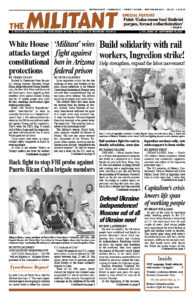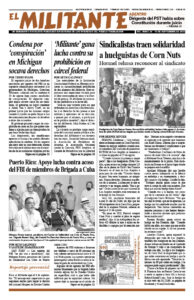HOUSTON — The deepening economic attacks on working people and how to win people to the fight for women’s emancipation were discussed by hundreds from across the country participating in a national Women’s Convention here Aug. 12-14. The event was sponsored by Women’s March, which was organized by supporters of the Democratic Party after Donald Trump’s election in 2016.
The conference took place as profit-driven attacks by bosses, backed by their Democratic and Republican parties, are coming down hard on working people, our unions and our families.
Soaring prices and jobs with increasingly debilitating work schedules restrict choices women have about jobs, family responsibilities, and when and whether to bear children. More responsibility for care of the elderly and children is pushed onto workers’ families, especially onto women. Under these conditions more workers have started to use our unions to defend ourselves.
But the reason the conference was organized was to recruit women to work to elect Democrats in 2022 and beyond. This was the central feature of conference plenary sessions, each of which drew up to 600 people. Conference sponsors had provided many of the participants with scholarships to cover the substantial costs required to attend.
A different point of view was presented by members of the Socialist Workers Party and some other conference participants, who pointed to recent union struggles and what they open up for fighting for women’s rights and charting a working-class road forward. Party members joined in debates at workshops and around the party’s booth, which was packed during break times.
After hearing this reporter explain in one workshop that “the key divisions are class divisions, not between red and blue states,” Genis Nelson, from San Angelo, Texas, decided to visit the SWP booth.
“We shouldn’t have to constantly fight to just be human,” she told Alyson Kennedy, the party’s candidate for Texas governor. When she was a single mother, Nelson had to work several jobs, “I made just too much to be able to get food stamps.”
She told Kennedy her husband works in the oil fields where his bosses get around a 15-hour limit to the workday. “They call him to start after 9 a.m., knowing they can keep him out working past midnight because the day will have ‘reset,’” Nelson said. The unpredictable hours he works means she can’t hold a job as they have children to look after.
“Our party urges unions to lead a fight for workers control of production,” Kennedy said. “Workers would do a much better job at safeguarding safety and setting decent working conditions.” She pointed to Cuba, “where workers took control of the economy and changed the conditions of life and work by making a socialist revolution.”
Nelson said she had heard only negative things about socialism, but now wanted to learn more and got a subscription to the Militant.
Workshop debates
Panelists at one workshop tried to rally support for Democratic candidates by praising some recent bills and executive orders promoted by President Biden.
“There is a deep economic and social crisis of the capitalist system,” Kennedy said in response to those lauding the administration. “It’s a system based on the exploitation of working people.” She pointed to “strikes against ‘suicide shifts,’ and long hours that make it difficult to raise a family. This is the way we will change things when we stand up and fight, and build a powerful movement of working people that can make a fundamental change, a class change, and put workers and farmers in power.”
During discussion in the workshop “Transformation in Motion: Care Can’t Wait!” SWP member Jacob Perasso pointed to the recent vote in Kansas defeating a proposed change to the state constitution that would have allowed lawmakers to ban abortion. “It showed the Supreme Court decision overturning Roe v. Wade opened a much-needed political debate and discussion.”
Panelist Fatima Goss Graves from the National Women’s Law Center disagreed. “I don’t think we had to overturn Roe for people to align,” she said.
Lively discussion on this continued at the SWP booth. “The Roe ruling was unconstitutional,” Kennedy told visitors to the booth. “The court acted like it was a legislative body and cut off discussion.
“As we join to fight against attacks by the bosses and the government today, we have the chance to win people’s support for access to family planning, contraception and, for those who choose, to abortion,” she said.
Student Brooke Parlor had led a protest for access to abortion in downtown Texarkana, Texas. She wanted to learn about the roots of women’s oppression and bought a subscription to the Militant and three books, including The Origins of the Family, Private Property, and the State by Frederick Engels. In all, 38 people subscribed to the Militant and 126 books were sold from the party’s booth.
Ken Doiron, 19, from Groves, Texas, told Kennedy she “helped organize protests for abortion rights every week in Beaumont.”
Kennedy told Doiron she had visited the city several times during the nine-month lockout of United Steelworkers union oil workers at the ExxonMobil refinery, bringing them solidarity after they refused to accept a union-gutting contract last year. Doiron brought others to the SWP booth and they invited Kennedy to visit them in Beaumont.
Actions promoted at the convention include marches on Oct. 7-9 to turn out votes for Democrats. But they’ll also be an opportunity to discuss what working people face and how best to advance the fight for women’s emancipation.


